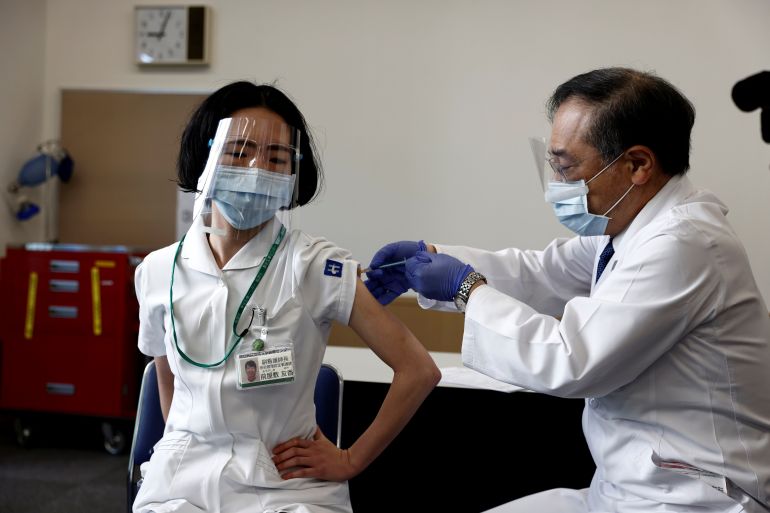Japan kicks off COVID vaccine drive with healthcare workers
Japan begins mass inoculation campaign with just five months to go before the Tokyo 2020 Olympics.

Japan has launched its COVID-19 inoculation drive, giving the Pfizer vaccine to healthcare workers from selected hospitals across the country as Prime Minister Yoshihide Suga attempts to defy the odds and host the Olympics during the northern summer.
Local TV screened footage of hospital workers in Tokyo getting their injections on Wednesday.
Keep reading
list of 4 itemsSyringe shortage hampers Japan’s COVID-19 vaccination drive
Japan’s economy performed better than expected in last quarter
Japan plans mass vaccination as Olympic doubts mount
Some 40,000 doctors and nurses from 100 selected hospitals across the country were set to receive their first doses during the first phase of the campaign. The progress the inoculation drive might make is uncertain, however, in a country concerned about possible shortages of imported vaccines and where people are often reluctant to take vaccines due to worries about side effects.
At the Tokyo Medical Centre, Director Kazuhiro Araki volunteered to be the first at the facility to receive the shot.
“The vaccine plays an important role in anti-coronavirus measures. So I thought as a director I should take the lead and get the shot,” he told reporters afterwards.
“I don’t like getting shots very much,” he admitted. “But it wasn’t painful, so it was good. I was relieved.”
Nurse Rino Yoshida, wearing a face mask and visor, was calm and relaxed as she too became one of the first people in Japan to be vaccinated outside of clinical trials.
“I felt it going in but it wasn’t sore. There’s no real pain or swelling,” she told national broadcaster NHK.
“The mortality rate and the risk of illness have gone down overseas, so hopefully vaccinations starting in Japan can change the situation here,” she said.
Japan’s mistrust of vaccines is decades old. Many people have a vague unease about vaccines, partly because their side effects have often been played up. Half of the recipients of the first shots will keep daily records of their condition for seven weeks, data that will be used in a health study meant to inform people worried about the side effects.
Supply worries
The campaign follows the government’s approval on Sunday for the vaccine developed and supplied by Pfizer, which has been used in many other countries since December.
Japan fell behind after it asked Pfizer to conduct clinical tests with Japanese people in addition to the company’s earlier tests in six other nations. But officials say it was necessary to address the concerns of many Japanese about vaccine safety.
Japan has signed contracts for a combined total of 314 million doses from Pfizer, AstraZeneca and Moderna – enough for 157 million people.
Inoculating the country’s 126-million strong population swiftly is a top priority for Suga’s government with the postponed Tokyo 2020 Olympics scheduled to start in late July.
Still, the complete roll-out of the programme is expected to take a year. Inoculations of 3.7 million more health workers will begin in March, followed by about 36 million people aged 65 and older starting in April. People with underlying health issues, as well as caregivers at nursing homes and other facilities, will be next, before the general population.
It will be around June by the time the rest of the population has its turn. That means reaching a so-called “herd immunity” against the virus before the Olympic would be impossible, experts say.
“We have been focusing on how to smoothly vaccinate the elderly, so we haven’t yet been strategically thinking about future” shots for young people, Taro Kono, Japan’s minister overseeing vaccinations, told the media on Tuesday.
“I’m not really taking the Olympics into my consideration. I need to roll out the vaccine as I get the supply from Europe,” he added.
Separately, there are also fears that millions of the Pfizer vaccine doses could be wasted due to a shortage of syringes required to maximise the number of shots from each vial.
Japan has so far recorded about 415,000 COVID-19 cases, including 7,013 deaths.
Although daily cases have been in decline in recent weeks after peaking in early January, Tokyo and nine other prefectures remain under a state of emergency to prevent further spread of the disease.